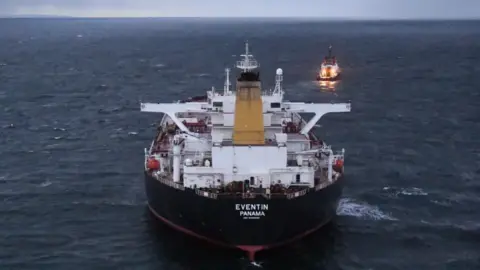In a significant move against the ongoing conflict in Ukraine, the United Kingdom is poised to announce new sanctions targeting what has been described as Russian President Vladimir Putin’s “shadow fleet”. This fleet consists of oil tankers reportedly used by Russia to circumvent existing sanctions that have been placed on its oil and gas exports since the onset of the war in 2022. The initiative is set to be unveiled by UK Opposition Leader Sir Keir Starmer during a meeting of the Joint Expeditionary Force (JEF) in Oslo, Norway.
The UK government is preparing to impose restrictions on up to 100 vessels associated with this shadow fleet, which has allegedly facilitated the transportation of oil worth over £18 billion. These tankers, characterized as “decrepit and dangerous”, have been accused of enabling the Kremlin’s military operations by financially supporting its war agenda. In a clear message, Prime Minister Rishi Sunak has stated that the UK will do all it can to dismantle this operation and cut off Putin’s access to oil revenues, thereby crippling his military efforts.
To provide a bit of background, the sanctions on Russian energy exports were instated by many Western nations as a direct response to the invasion of Ukraine. The sanctions aimed to restrict imports and impose price caps on Russian oil, thereby limiting the revenue flow to the Russian government. However, the Kremlin’s response involved the creation of a shadow fleet of oil tankers, whose ownership and operations are intentionally obscured, making them challenging to track and sanction effectively.
The implications of the new sanctions are extensive. The UK plans to bar these sanctioned vessels from entering British ports, and they may also face detention in UK territorial waters. This would be a decisive step in disrupting the operational capabilities of these vessels and, by extension, the financial lifeline they provide to Russia. Starmer expressed that any pressure applied to Moscow is a step towards achieving peace in Ukraine, which he positions as ultimately beneficial for security and prosperity in the UK.
The JEF meeting, which comprises ten nations including Denmark, Norway, and the Netherlands, is also expected to yield additional support for Ukraine’s military efforts. The collaborative nature of this initiative underscores a unified Western response to Russia’s maneuvers, seeking to bolster Ukraine amidst the ongoing hostilities. The UK has previously imposed sanctions against a number of shadow vessels, with up to 133 ships being restricted during a JEF meeting in December 2024.
As the global situation evolves, the expected sanctions not only aim to diminish Russia’s military capabilities but also signal a renewed commitment from Western powers to uphold international laws and resist breaches of sovereignty. The focus remains on how such measures can collectively pressure the Russian government and contribute to a sustainable resolution to the conflict.
In the backdrop of these developments is the recognition of the risks inherent in maritime logistics as well, particularly after reports of damage to undersea cables in the Baltic Sea that have raised concerns about reckless navigation and environmental safety associated with these decrepit vessels. Continued scrutiny over the activities of the shadow fleet will likely engage international maritime authorities and colleagues in maritime law, as they navigate the challenges presented by such covert operations.
In summary, the UK’s announcement regarding new sanctions on Putin’s shadow fleet indicates a robust strategy aimed at impeding Russia’s ability to fund its war efforts in Ukraine while showcasing a broader coalition of nations united in response to aggression on European soil.



